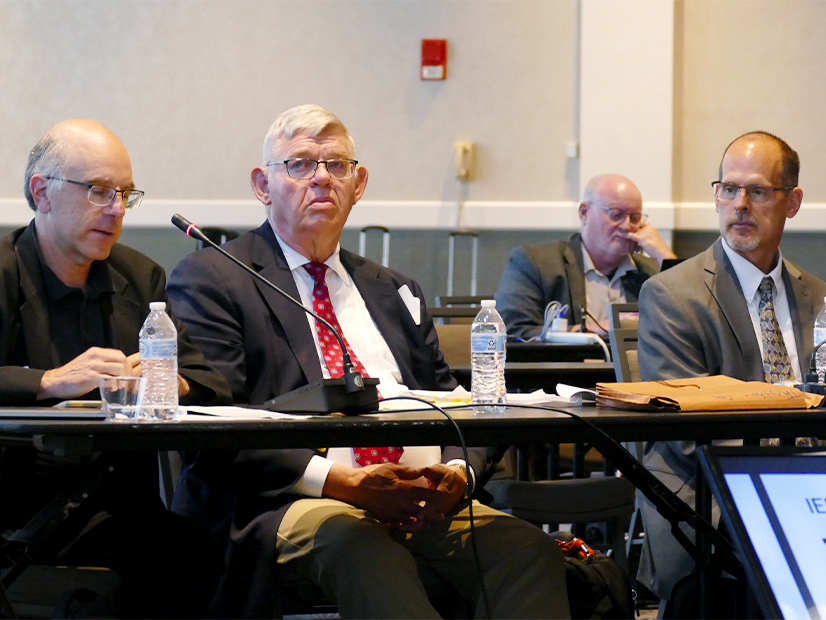
SPP’s Board of Directors rejected an industry panel’s recommendation to award a competitive project in New Mexico, leaving staff and members unsure of next steps.
ST. PAUL, Minn. — SPP’s Board of Directors on Tuesday rejected an industry panel’s recommendation to award a competitive project in New Mexico, leaving staff unsure of the next steps.
“This is a first for us. We probably need a little bit of guidance,” SPP CEO Barbara Sugg said.
Pointing in General Counsel Paul Suskie’s direction, she asked her governance “guru” for guidance.
Suskie said SPP’s tariff does not “contemplate” remanding the project’s evaluation back to the five-person industry expert panel (IEP) responsible for awarding projects under the RTO’s competitive selection process. According to the tariff, the board could select either the recommended or alternate proposal, based primarily on the information provided by the panel, he said.
The IEP “put so much time and energy into this, I think it would be very difficult for them to come back with a different answer,” Sugg said.
“My advice to you, if you turn down our recommendation, is there’s only one other recommendation that could come up for your vote,” said Mike Jacobs, the panel’s chair and president of consulting firm Both Supply & Demand. He said if the board directed the IEP to run further projections and scenarios, “we’ll report back to you, but the analysis could lead to paralysis.”
The directors debated their options before deciding to take up the issue during their normal post-meeting debrief.
SPP said Wednesday that the board is working to determine “the best course of action to reach a timely outcome that preserves the integrity” of its FERC-approved Order 1000 process.
“SPP will communicate their plans to stakeholders in the coming days,” spokesperson Derek Wingfield said.
The IEP was seated last August to evaluate anonymous bids to build a 345-kV double-circuit line in eastern New Mexico from Crossroads through Hobbs to Roadrunner in two segments totaling 143 miles. The upgrade, estimated to cost $376.3 million, was proposed by Xcel Energy subsidiary Southwestern Public Service (SPS) as an alternative to a previously identified project in the 2021 Integrated Transmission Plan. (See SPP Board of Directors/Members Committee Briefs: July 26, 2022.)
The panel received only three bids for the project, two of them from the same entity. Following the process, it unanimously recommended Proposal B, which accumulated the most points in the scoring system with 1,023.38 out of a possible 1,100. Proposal B also had the high scores in three of the five categories and placed second in another.
The IEP said the winning proposal presented “the best evidence that it can produce a successful project, built within budget; would operate as intended and in accordance with the requirements set out by SPP; and would be constructed in a safe manner.”
Proposal B also had the highest estimated construction cost at $291.6 million. Proposal C, which had a submitted cost of $220 million but finished third in the scoring, was selected as the alternate.
The proposal only gathered three “for” votes during the Members Committee’s advisory vote. Twelve members abstained, and seven voted against it. Ironically, one of those voting “no” was SPS, the incumbent transmission owner and widely believed to be one of the two bidders along with NextEra Energy. (The Florida-based transmission developer does not have a vote on the committee.)
“We do have an indication from the members that the motion shouldn’t pass. We didn’t get specific guidance on members about why they voted ‘no,’” Director John Cupparo said. “We’re in a bit of a conundrum. How do we extricate ourselves from this situation?”
Jacobs, who has participated on three of SPP’s five IEP panels and chaired two of them, was unable to satisfactorily answer Director Larry Altenbaumer’s questions attempting to understand why the more expensive option was recommended.
“I’m not sure the IEP’s recommendation is necessarily the wrong one,” Cupparo said. “What I’m really looking for is more supportive analysis that tells me the risk is too great for a lower-cost alternative. I don’t know if that’s the case or not, but the pieces seem to be there. I don’t know if that’s something that can be turned around quickly or evaluated, but that would certainly be helpful.”





